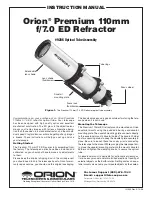
Optical tube
This is the main optical component of the telescope.
The glass lens at the front of the tube gathers incom-
ing light and focuses it by bending (or refracting) the
light rays. The tube assembly has several parts built
into it, which are shown and discussed in detail in the
next section.
90° Mirror star diagonal
The diagonal contains a mirror that reflects the light
gathered through the optical tube to the eyepiece. The
diagonal is angled to allow for viewing objects that are
high in the sky from a comfortable position.
25mm Kellner eyepiece
The eyepiece is the part of the telescope that you actu-
ally look through to see things. The focal length of the
eyepiece and the telescope determines the magnifying
power of the telescope. Magnification is discussed in
more detail in the Using Your Telescope section.
EZ Finder II reflex sight
This is a special “finder” that helps you aim the tele-
scope and locate objects in the sky for viewing. The EZ
Finder II generates a red LED “dot” that shows where
your telescope is aimed. The use of the EZ Finder II is
discussed in the Getting Started section.
Equatorial mount
This mount couples the optical tube (1) to the tripod. It
also serves to allow tracking of celestial objects with
the telescope when properly polar-aligned. See the
Aligning the Equatorial Mount section for more details.
Counterweight
This counterweight will balance out the optical tube (1)
when it is being aimed at celestial objects.
Right ascension slow-motion control cable
This cable is used to make small movements in right
ascension when aiming the telescope. Right ascension
is explained in the Aligning the Equatorial Mount sec-
tion. This cable is also used to “track” stellar objects
and keep them in the eyepiece’s (3) field of view
Declination slow-motion cable
This cable is used to make small movements in
declination when aiming the telescope. Declination is
explained in the Aligning the Equatorial Mount section.
Tripod legs
These aluminum tripod legs support the telescope and
can extend from 27" to 50" long.
Accessory Tray
This tray is a convenient place for holding extra eye-
pieces and other small pieces of equipment.
Accessory tray bracket
This bracket holds the accessory tray (10).
Leg lock knobs
These knobs lock the tripod legs into place. Loosen
them to lengthen or shorten the tripod legs. Tighten
them once you have the leg at the desired length. Be
certain that all three tripod legs are equally extended to
assure your telescope is level.
12
11
10
9
8
7
6
5
4
3
2
1
5
®
The Basic Components of Your Telescope
Figure 1 shows the fully assembled Observer 60mm EQ. All the major components of the telescope are described and num-
bered to help you identify each part and understand its use. Refer back to this figure when assembling the telescope.




























